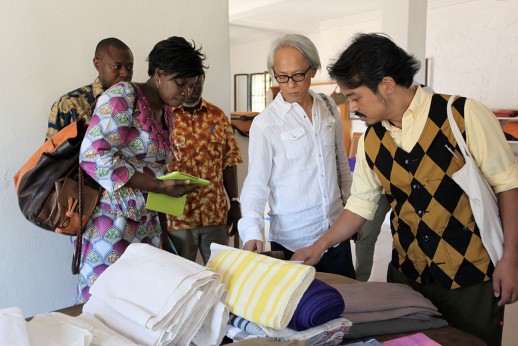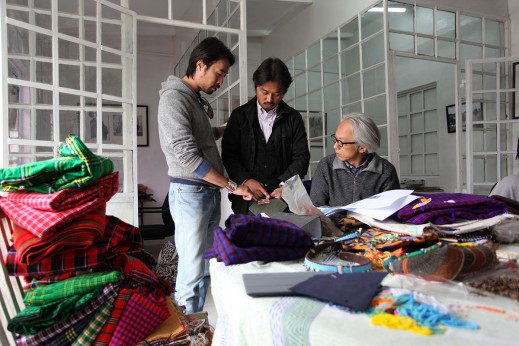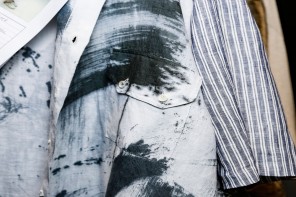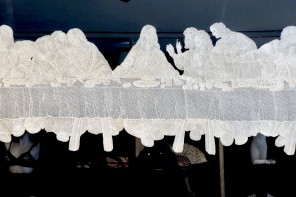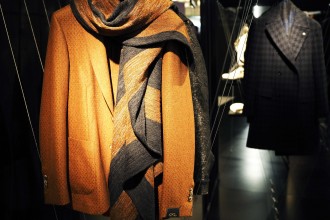Florence, Italy–Hirofumi Kurino, co-founder and creative advisor of Japan’s United Arrows, sits down with BACO’s Editor-in-Chief Sofia Celeste and discusses the value and role of artisans in fashion today, as well as why Japan’s millennials embracing artisanal fashions more than ever.
If artisans are the center of a big luxury brand, and they can’t live without them… then why aren’t artisans paid as much as managers?
It is a very realistic question. I don’t know about payment or salaries. I can say that they should respect other creative directors or managers. They are very high high high standards. Without the artisans there is no brand. Brands are based on artisanal skills. If this subject is about the position or heirarchy, I can ask “why” as you mention. Actually, I don’t know about the salary.
You travel all over the world in search of artisans. Where have you made the best discoveries in terms of talent?
About two years ago, I went to Africa with Simone Cipriani of the Ethical Fashion Initiative. I met Simone two or three years ago, and we had a positive conversation. And we decided to start a [responsible fashion] brand called Tege, whose production is generated in Kenya and Burkina Faso. And perhaps, in the near future, we will produce also in Haiti and Cambodia … All of these places have the artisanal skill and people that carry that tradition of that artisanal skill. We respect this. At the same time, we know that if we are dealing with them and producing with them, at least we can help sustain their lives, their livelihood and they can help themselves out of poverty.
Are you paying them more than the national average in their homelands?
Not us exactly, but the project itself. Yes.
What is technology’s role in linking you with the artisans and procuring talent?
We need technology in some ways like communication, but production itself needs hands. Computers cannot make beadwork. Robots cannot make hand-woven materials from Burkino Faso. Innovation and working with artisans and working with hands is still so important.
What is the situation in Japan: Is the artisan tradition in peril? Who is carrying on the kimono-making tradition?
Until recently – everyone said those traditions are going to die. Handcraft is going to die. The Kimono companies are gonna die. Thankfully, the younger generation has rediscovered the charm of the kimono, as well as companies like ours and what we are doing. Compared to cashmere and compared to Egyptian cotton and compared to Harris tweed, we have seen a rediscovery of the exquisite nature of Japanese hand-loomed things. This rediscovery has infused a sense of vitality into the kimono-weaving community and its artisans. Before they die out, we can start to save them.
Are technologically-savvy young people in Japan ready to take on these traditions?
Yes. Young people are more interested in attending shoe-making and tailoring schools and learning how to hand-weave. This population is increasing. Very interesting.
Do you work with technologically advanced sustainable fibers in clothes?
Yes, a lot. This is very important for us. It is not 100 percent of our production, but we try to use the right fabric and right manufacturing as much as we can.
Are you using recycled materials?
Sometimes… we using recycled fabrics like plastic bottles and milk proteins. Not like Patagonia. They are doing this more aggressively.
Do you think fashion should do more? Do you think if they do they can really change things?
Yes, the fashion world should be doing more of this. It can change things. It starts from morale. It starts from the concept and the philosophy. The young generation thinks it is cool [to wear sustainable fashions]. It is NOT cool to waste.
So Japanese millennials are looking for more ethical clothing rather than fast fashion?
Yes, that is why in Japan, the fast fashion stores are going downhill. That is why Topshop saw their business in Japan come to an end. Also, other fast fashion companies are facing big problems in Japan, because they cannot sell. The younger generation is aware that they should buy more sustainable goods, more meaningful production.
So in Japan, young people are more conscious of the importance of sustainability?
They are more conscious. Happily, that is why we can survive.
Why is this? Because Japanese have a superior sense of taste?
We are happy to keep traditions. In the New Year for example, we gather our families and eat ozoni (soup) and osechi and we drink tea … still a lot of old traditions exist in our lives without being conscious of this. In general, people think Japan is a modern world. Japan is a modern world, but at the same time we keep a good balance between the modern and classic and tradition and innovation.
You are one of the most respected individuals in retail in Japan and in the world — in fact, some people call you the “oracle” of fashion. How are you educating the world about the value of artisans in a modern age?
We are using a lot of computers and emails of course. Retail is our business and that is human to human. So education is simple. The education is simple: We stress how to say thank you and good morning and say arigato. This is very old school way and still exists in our company and is getting more important. No robot can do this.
____________________________________________________________________________
ALSO IN THE EMPOWERING ARTISANS ISSUE: Period Features: Japanese Design, Indian Sari Craft, BACO Getaway: Namibia, Kinsfolk: Sri Lankan Craft, Swiss Style , OWL: Paris’ Link to African Fashion, Hirofumi Kurino: Japan’s Oracle of Fashion, Rahul Mishra on Empowering Artisan Villages


